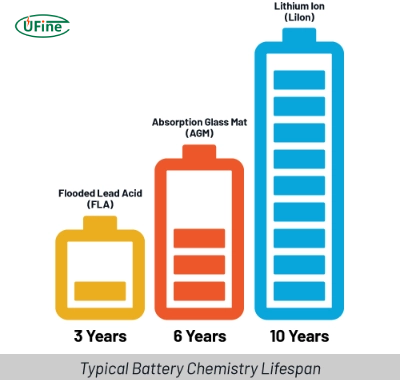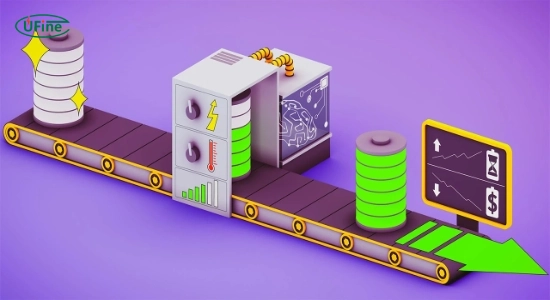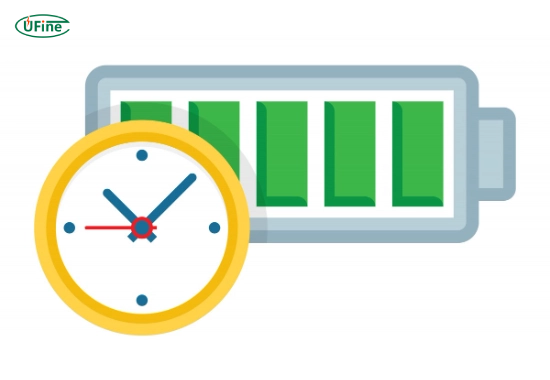Understanding the differences between battery warranty and lifespan is crucial for anyone using batteries in their devices or vehicles. While these terms are often confusing, they refer to very different battery performance and reliability aspects. This article will explore each concept in detail, helping you make informed choices about your battery needs.
Part 1. What is battery lifespan?
Battery lifespan is the total time a battery can effectively hold a charge and perform its intended function before it needs to be replaced. The lifespan of a battery can vary significantly based on several factors, including:
Battery Type: Different types of batteries have different lifespans. For example:
- Lithium-ion batteries, commonly used in smartphones and electric vehicles, typically last between 8 to 15 years.
- Lead-acid batteries, often used in cars, usually last around 3 to 5 years.
- Nickel-metal hydride (NiMH) batteries, found in hybrid vehicles, can last about 5 to 10 years.
Usage Patterns: How you use your battery significantly affects its lifespan. Frequent deep discharges (using most of the battery’s power before recharging) can shorten its life. For instance, regularly draining a lithium-ion battery below 20% can lead to faster degradation.
Environmental Conditions: Extreme temperatures can significantly impact battery performance. High heat can cause batteries to degrade faster, while extreme cold can temporarily reduce efficiency.
Charging Habits: Proper charging practices are essential for extending battery life. Overcharging or leaving a battery plugged in after it’s fully charged can lead to overheating and damage over time.
Understanding these factors helps consumers manage their expectations regarding how long a battery will last and how to care for it properly.
Part 2. What is a battery warranty?
A battery warranty is a promise from the manufacturer that covers the performance and reliability of the battery for a specific period. It typically includes coverage for defects in materials and artistry but does not cover damage caused by misuse or external factors. Key aspects of battery warranties include:
Duration: Warranties can vary widely, from as short as one year to as long as ten years or more. For example, many automotive batteries come with warranties lasting between 2 and 5 years, while some electric vehicle batteries may have up to 8 years.
Coverage Types: Warranties may offer different types of coverage:
- Free Replacement Warranty: This covers the total cost of replacing a defective battery during the initial warranty period.
- Prorated Warranty: After the initial period, this type allows for partial reimbursement based on how long you’ve owned the battery.
- Conditions: Manufacturers often include specific conditions that must be met to honor claims. These may include proper installation, maintenance, and usage per the manufacturer’s guidelines.
Understanding these warranty details is vital for consumers to know what protections they have if their battery fails prematurely.
Part 3. How are battery warranty and lifespan related?
The relationship between battery warranty and battery lifespan is significant but distinct. In essence, while lifespan refers to how long a battery will function effectively, warranty indicates how long the manufacturer stands behind that performance. Here’s how they relate:
- Expectation of Longevity: A more extended warranty often suggests that the manufacturer expects the battery to last longer. For example, if an electric vehicle’s battery comes with a ten-year warranty, it indicates confidence in its durability and performance over that period.
- Degradation vs. Failure: Warranties typically cover failures rather than gradual degradation. A battery may still function within its warranty period but may not perform at total capacity due to age-related decline.
- Consumer Protection: Warranties act as a safety net for consumers against premature failure. Understanding lifespan helps consumers manage expectations regarding performance over time while knowing their rights under warranty coverage.
Part 4. Common types of battery warranties
When purchasing batteries, it’s essential to know about the different types of warranties available:
- Free Replacement Warranty: This type covers the entire cost of replacing a defective battery during the initial warranty period. If your battery fails due to manufacturing defects within this timeframe, you receive a new one at no cost.
- Prorated Warranty: After an initial free replacement period, this type allows for partial reimbursement based on how long you’ve owned the battery. For example, if your warranty lasts five years and your battery fails after three years, you might receive a discount on a new purchase based on age.
- Composite Warranty: Some manufacturers combine free replacement and prorated coverage within their warranty terms, providing comprehensive protection throughout the warranty period.
Part 5. Factors influencing battery lifespan
Several key factors influence how long a battery lasts:
1. Quality of Materials
The materials used in a battery directly affect its performance and durability:
- Cathode Materials: Batteries with high-grade cathodes, such as nickel-rich NMC (Nickel-Manganese-Cobalt) or LFP (Lithium Iron Phosphate), offer longer lifespans than lower-grade alternatives.
- Electrolytes: Advanced liquid or solid-state electrolytes improve stability and reduce internal resistance, leading to slower degradation.
- Separators: High-quality polymer or ceramic-coated separators help prevent internal short circuits, enhancing safety and longevity.
2. Manufacturing Process
Precision in manufacturing significantly influences how well a battery performs and how long it lasts:
- Electrode Coating: Uniform and precise coating of electrodes ensures consistent energy flow, reducing wear over time.
- Cell Formation: Advanced cell formation techniques, like pre-lithiation or initial cycling under controlled conditions, enhance the battery’s ability to retain charge cycles.
- Automation: Batteries produced using automated processes reduce defects caused by human error, ensuring higher consistency in quality.
3. Maintenance Practices
Proper care and usage of a battery can prolong its service life:
- Charging Habits: To minimize stress on the battery, avoid deep discharges (below 20%) or overcharging (above 100%).
- Storage Conditions: To reduce chemical degradation, store batteries in a cool, dry place, ideally at around 50% charge.
- Terminal Care: Clean battery terminals regularly with a soft cloth to prevent corrosion that may interfere with performance.
Part 6. How to maximize battery lifespan?
To ensure you get the most out of your battery investment:
- Avoid Deep Discharges: Avoid letting your battery drain completely before recharging it. It is ideal for lithium-ion batteries to keep them charged between 20% and 80%; this practice helps prevent cell stress.
- Store Properly: If you need to store your batteries for an extended period, keep them in a cool, dry place and ensure they are partially charged (around 50% is ideal). This helps prevent degradation during inactivity.
- Regular Maintenance: Check connections for corrosion regularly and ensure terminals are clean. Inspect for wear or damage; early detection can prevent more significant issues later.
Part 7. Understanding degradation rates
Batteries naturally degrade over time due to chemical reactions occurring during charge cycles. Understanding these degradation rates is vital:
- Cycle Life: This refers to the number of complete charge-discharge cycles before a significant capacity loss occurs. Most lithium-ion batteries have around 500–1500 cycles, depending on usage patterns and conditions.
- Calendar Life: Even if not used regularly, batteries can degrade over time due to chemical aging processes. Calendar life typically ranges from 5 to 15 years, depending on the battery and environmental conditions during storage.
Part 8. How do manufacturers determine warranty periods?
Manufacturers set warranty periods based on various factors:
- Testing Data: Extensive testing during development helps determine average lifespans under different conditions; this data informs warranty offerings.
- Market Standards: Competitive analysis plays a role; manufacturers often align their warranties with industry benchmarks to remain attractive to consumers while ensuring they adequately cover expected lifespans.
- Consumer Feedback: Historical data regarding failures and customer feedback influence future warranty offerings as manufacturers aim to improve customer satisfaction through better products and services.
Part 9. FAQs
-
What happens if my battery fails during the warranty period?
If your battery fails during the warranty period due to manufacturing defects, contact the retailer or manufacturer with proof of purchase for replacement or repair according to their policy. -
Can I extend my battery warranty?
Some manufacturers offer extended warranties for an additional fee at purchase time or shortly afterward; check with your retailer for options for your specific product. -
Does using my vehicle frequently affect my car’s battery life?
Yes! Frequent use can help maintain your car’s battery life by keeping it charged; however, extreme driving conditions or frequent short trips may lead to faster degradation if the alternator is not fully recharged each time. -
Are all warranties created equal?
No! Warranties vary significantly between manufacturers regarding duration, coverage types (free replacement vs. prorated), and conditions that must be met for claims; always read the fine print carefully before purchasing. -
How do I know if my battery is still under warranty?
Check your original purchase receipt or any documentation provided at purchase time; many manufacturers also allow you to register your product online for easier tracking of warranty status.
Related Tags:
More Articles

How to Choose the Best Floor Scrubber Battery for Commercial Cleaning?
Selecting the ideal floor scrubber battery ensures a long runtime, rapid charging, and minimal maintenance for efficient commercial cleaning operations.
Battery for Blower vs Battery for Leaf Vacuum: Which One Should You Choose?
Battery for blower vs leaf vacuum—learn the key differences in power, fit, and runtime to choose the right battery for your outdoor tool needs.
How to Choose the Right Battery for Blower?
Choosing the right blower battery? Consider voltage, capacity, chemistry & usage. This guide helps match the best battery for peak performance.
How to Choose the Best Insulated Battery Box for Lithium Batteries?
Choosing the Best Insulated Battery Box for Lithium Batteries? Discover key factors such as size, material, and safety for optimal protection and performance.
7 Critical Elements on a Lithium Battery Shipping Label
What must be on a lithium battery shipping label? Learn 7 key elements to ensure safety, legal compliance, and correct handling across all transport modes.






